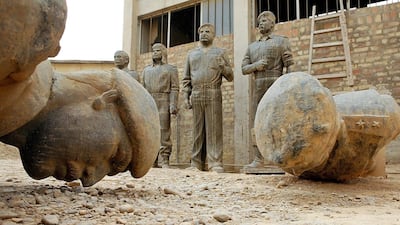As Iraqis mark the 21st anniversary of the US-led invasion that toppled Saddam Hussein's regime, discussions surrounding the presence of the US troops and the form of the security co-operation between Baghdad and Washington have taken centre stage.
These discussions have not been without challenges as both sides navigate complex security concerns, regional dynamics and the legacy of two decades of military intervention, lawmakers told The National.
“Our security forces have been through many battles over the past 20 years against armed groups, and the latest of them was Daesh [ISIS],” said Karim Abu Souda, deputy head of the Parliament’s Security and Defence Committee.
“We still need more training and equipment,” Mr Abu Souda added. “Wars have shifted from traditional to drone and cyber warfare as well as intelligence operations.”
In 2003, the US spearheaded an international coalition to invade Iraq, under the claim that it was developing and stockpiling weapons of mass destruction.
No such weapons were found, and the invasion plunged Iraq into chaos, and led to one of the bloodiest insurgencies, as well as decades of political and security instability.
Since then, the presence of the US troops has been a contentious issue, often shaping the landscape of Iraqi politics and security matters.
Winding down the anti-ISIS US-led international coalition and future relations will be top on the agenda for Iraqi Prime Minister Mohammed Shia Al Sudani’s expected visit to Washington. No date has been set yet for the visit.
In 2008, Baghdad and Washington signed the Strategic Framework Agreement that led to the US's withdrawal by the end of 2011, leaving behind a small number of troops to protect its embassy and to train and assist Iraqi forces. That agreement also shapes the relations and co-operation in other fields.
But foreign combat troops returned in 2014 in a US-led international coalition, when ISIS seized about a third of the country as the American-trained Iraqi security forces were unable to stop the terrorist group.
After the defeat of ISIS in Iraq by the end of 2017, the US started to reduce the number of its troops in the country – from about 5,000 to 2,500 now – along with other countries from the international coalition.
Since 2018, Iran-backed Shiite militias and political parties have been demanding the full withdrawal of the US troops. Sunni and Kurdish parties do not support that demand because they are concerned the troops' departure could lead to a power vacuum.
In 2020, Shiite politicians voted in parliament for the departure of foreign forces after the assassination of Iranian Gen Qassem Suleimani and senior Iraqi militia leader Abu Mahdi Al Muhandis in a US drone strike in Baghdad. The US refused to withdraw.
deputy head of the Parliament’s Security and Defence Committee
Under pressure from Iran-allied factions, the Prime Minister's main backers, Iraq in January initiated talks with US to end the coalition's mission. Baghdad is willing to reach bilateral security agreements with state members.
In recent weeks, negotiations at the technical level between US and Iraqi officials have intensified, said lawmaker Jawad Al Bulani, who sits on the parliamentary Security and Defence Committee.
Three joint committees are assessing the terrorism threat, the operational environment and the current and future options to enhance Iraqi security forces' capabilities, Mr Al Bulani told The National.
“Things are on the right path and there is understanding from all parties,” Mr Al Bulani, who served as interior minister from 2006 to 2010, said.
He didn’t elaborate but said “internal security and political challenges are what guide the compass of the government” which may in turn lead to reaching agreements on some issues before others.
Asked whether there is a timeframe for talks to be concluded, Mr Abu Souda said: “That depends on the regional and international developments.”
The upcoming US elections in November, the war on Gaza and its ramifications in the region “impact the discussions", he said, "as Iraq is an active state in the region”.
The Israel-Gaza war has prompted Yemen’s Tehran-aligned Houthis to attack commercial ships transiting the Red Sea.
In Iraq, militant groups stepped up attacks on US military installations in the country before halting them early last month.
And in Lebanon, the powerful Hezbollah group has waged an intensifying border conflict against Israel.

Unlike hardline Shiite militias, security officials and some politicians have voiced concern that Iraq can’t afford a complete and abrupt withdrawal of US troops from the country.
“I don’t think the Americans want a full withdrawal. That is clear,” former Iraqi prime minister Haider Al Abadi, a moderate member of Iraq’s ruling Shia Co-ordination Framework, told journalists this month.
“Also, I do not think there is an Iraqi desire among the political forces to dispense entirely with the Americans, even though there is a feeling today that their presence at this time causes more problems than solutions,” Mr Al Abadi said.
In an Opinion piece published last week in the state-run newspaper Al Sabah, US ambassador to Iraq Alina Romanowski reminded Iraqis of the risks of withdrawal.
“The risks involved in answering this question [about the type of long-term relationship] are significant, not only for US-Iraqi relations but also for Iraq’s relations with the world,” Ms Romanowski wrote.
She warned of the “ongoing threat” ISIS still poses to Iraq whether from inside the country or from neighbouring Syria.


